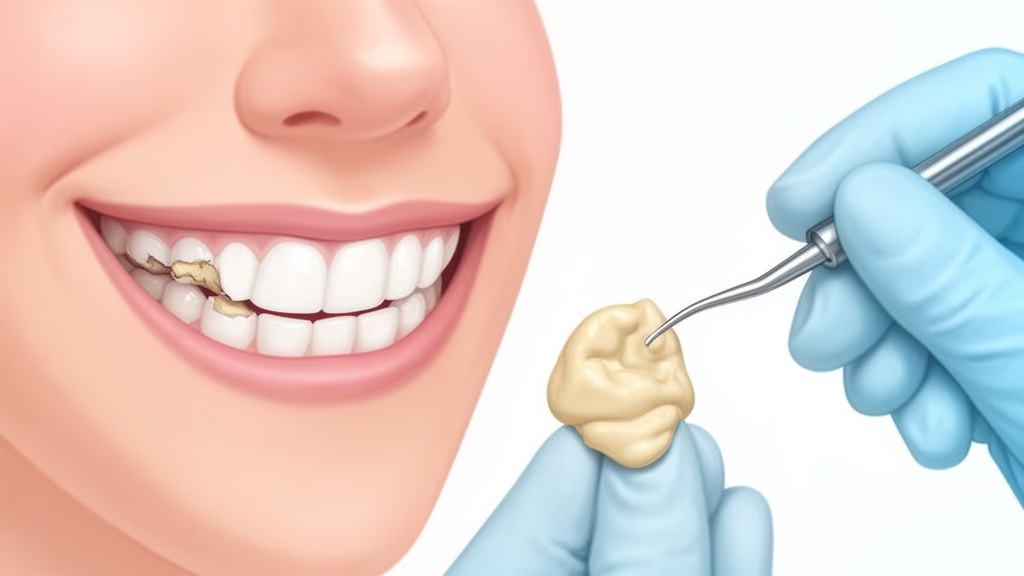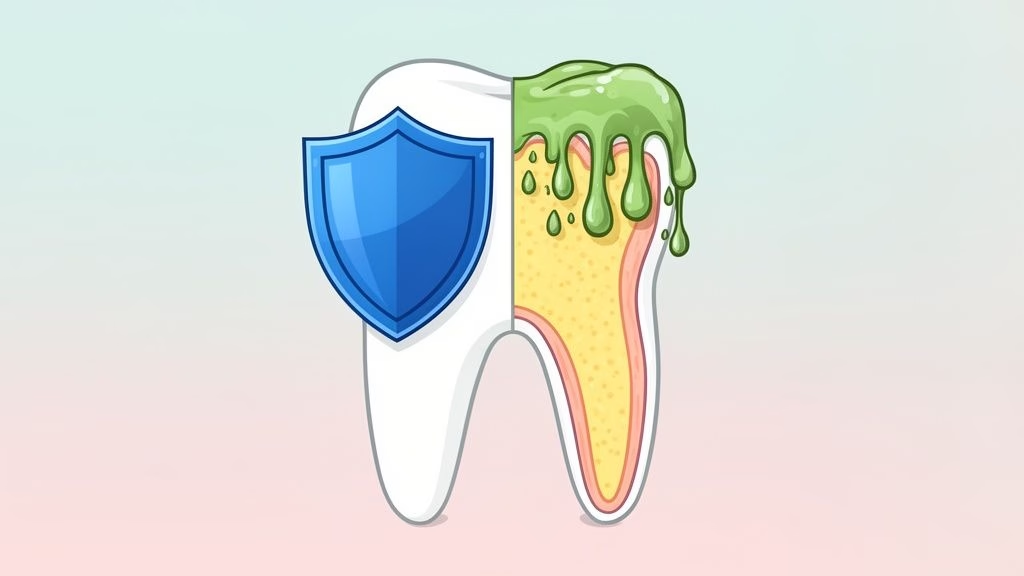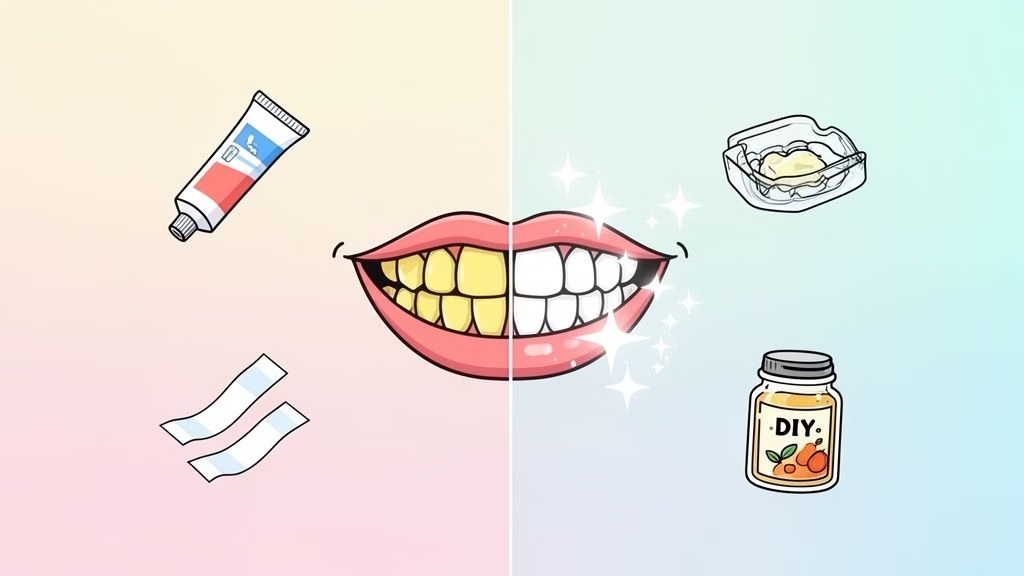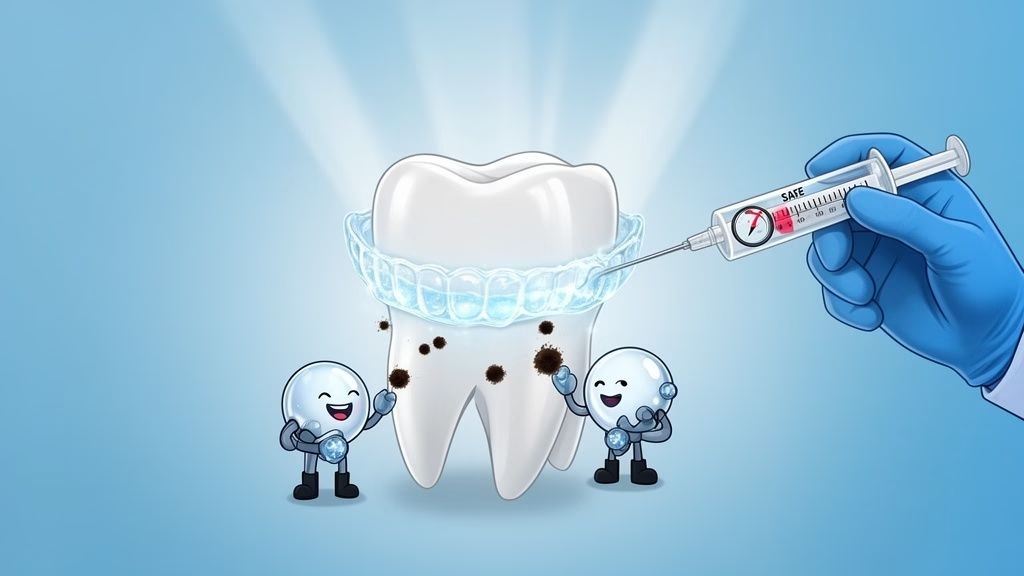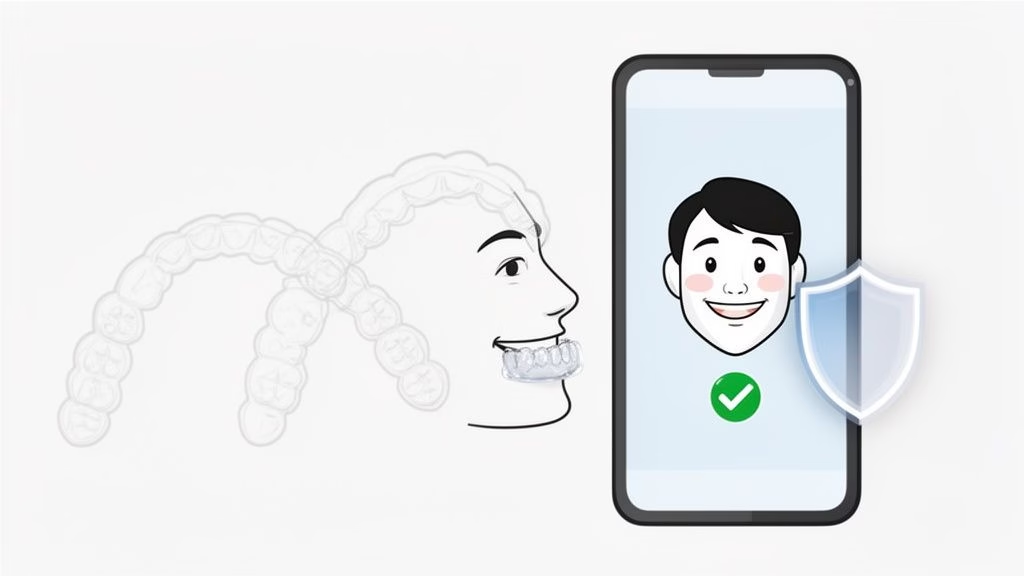How to Prevent Oral Cancer A Practical Guide
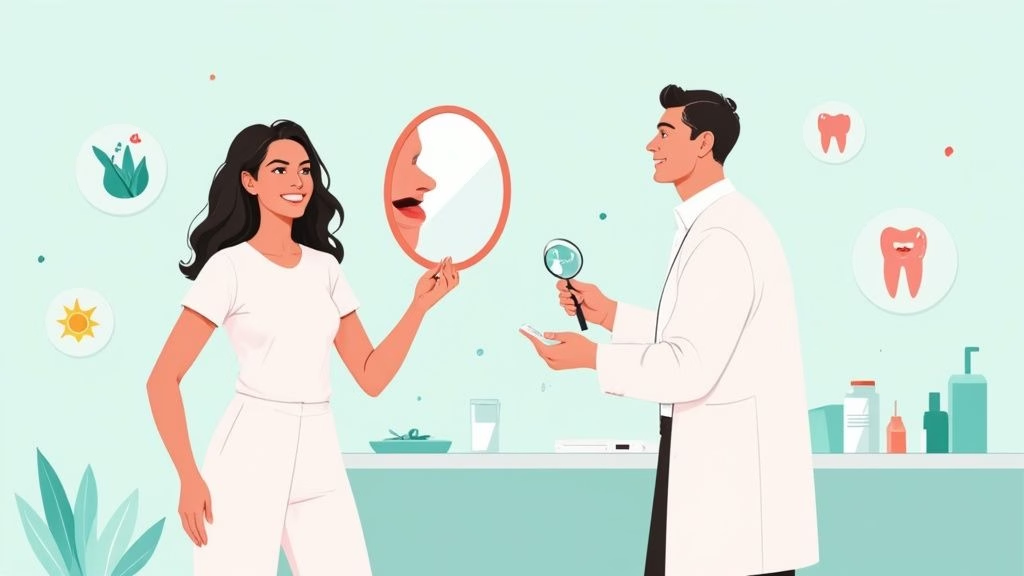
When it comes to preventing oral cancer, it all starts with understanding your personal risks and building proactive habits. The cornerstones of prevention really boil down to smart lifestyle choices, a nutrient-rich diet, and, most importantly, consistent dental care. By taking control of these areas, you can dramatically lower your risk and genuinely take charge of your oral health.
Understanding Your Oral Cancer Risk
Let’s not beat around the bush—the increase in oral cancer diagnoses is a real concern, but prevention is an incredibly powerful tool. The first step in building a solid defence is getting to grips with the factors that contribute to your own personal risk.
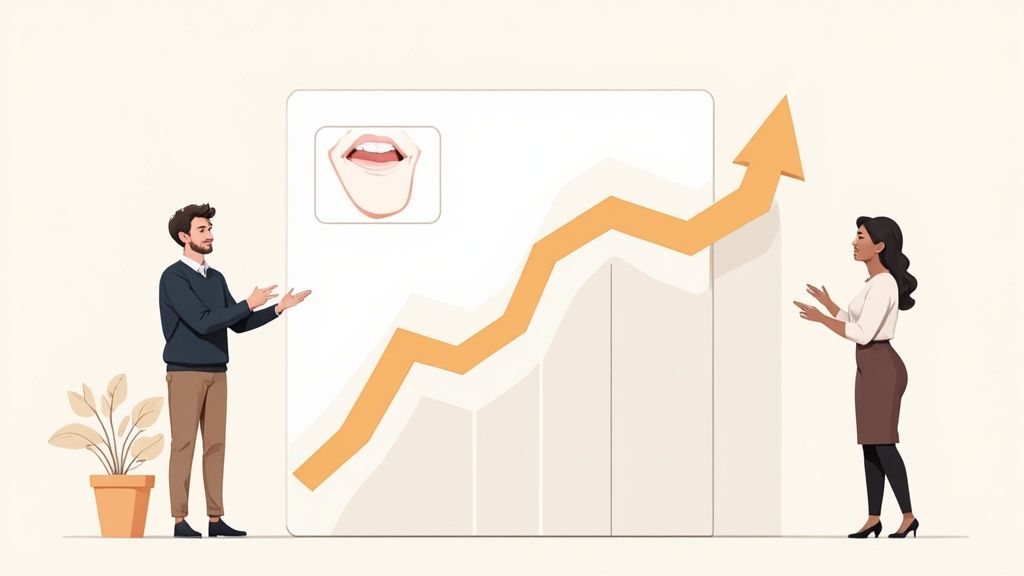
This isn’t about scaremongering; it’s about empowerment. A huge number of cases are entirely preventable simply through awareness and making better-informed choices. This guide will walk you through the areas where you can have the most impact: your lifestyle, your diet, and your relationship with your dentist.
The statistics really drive home why this is so critical. Oral cancer rates in the UK have been climbing sharply. In England alone, 10,825 people were diagnosed with mouth cancer in a single recent year. That’s a shocking 133% increase compared to figures from just two decades ago. The tough part is that survival rates haven’t improved at the same pace, which underlines just how urgent early detection and prevention are.
The Power of Proactive Care
Waiting for symptoms to pop up is a waiting game you don’t want to play. Real prevention is about being proactive—it’s the small, consistent actions you take every day that build up to reduce your risk over time. It’s about creating a lifestyle that supports your oral health, not just putting out fires when they start.
Think of it like servicing your car. You don’t wait for the engine to seize before you top up the oil. Regular check-ups and maintenance keep it running smoothly, and your health is no different.
“Your daily choices could be your strongest defence against cancer. Prevention is not about making drastic changes overnight; it’s about making smart, consistent choices every day.”
Knowing your risk factors is step one, but it’s just as vital to understand the importance of preventive dental care and its role in protecting your long-term health. Those regular dental visits are so much more than a scale and polish; they are, quite literally, life-saving screenings.
Key Pillars of Prevention
So, where do you begin? The journey to lowering your risk centres on three core areas. Each plays a unique but connected role in keeping you safe. To give you a quick overview, here are the most impactful steps we’ll be covering.
Key Prevention Strategies at a Glance
| Strategy Area | Key Action | Why It Matters |
|---|---|---|
| Lifestyle Habits | Cut out tobacco & limit alcohol | These are the two biggest known risk factors for oral cancer. |
| Diet & Nutrition | Eat a diet rich in fruit & veg | Antioxidants and vitamins help protect your body’s cells from damage. |
| Dental Care | Attend regular dental check-ups | Dentists are trained to spot the earliest signs, often before you can. |
| Self-Awareness | Perform monthly self-checks | Knowing what’s normal for your mouth helps you spot changes quickly. |
These pillars form the foundation of a strong preventative strategy, combining professional guidance with personal responsibility.
Here’s a closer look at what they involve:
- Lifestyle Adjustments: This is all about tackling the big-ticket items, mainly tobacco and alcohol use. Honestly, making changes here will give you the most bang for your buck in risk reduction.
- Dietary Choices: What you put on your plate can either fuel your body’s defences or weaken them. A diet packed with antioxidants is like giving your cells a shield against damage.
- Professional and Self-Screenings: Your dentist is your first line of defence for catching things early. When you pair their expertise with your own at-home checks, you create a powerful safety net.
At Toothfairy, we’re firm believers that great oral health starts with accessible dental care. Whether it’s for an emergency, a cosmetic touch-up, or a routine screening, finding a dentist shouldn’t be a hassle. We offer a smarter, more affordable way to get professional care, helping to remove the barriers that might keep you from getting the check-ups you need.
Making High-Impact Lifestyle Changes
Knowing your risk is one thing, but actively doing something about it is where you really take back control. Let’s get into the most significant lifestyle adjustments you can make to lower your chances of developing oral cancer. This isn’t just about hearing “don’t smoke” again; it’s about understanding why it’s so difficult and finding practical, supportive ways to make changes that actually stick.

The small choices you make every day have a massive cumulative effect on your long-term health. We’ll explore the tangible steps you can take, moving beyond generic rules to offer real-world advice that fits into your life.
Confronting Tobacco in All Its Forms
There’s no easy way to say this: tobacco is the single biggest avoidable risk factor for oral cancer. And that doesn’t just mean cigarettes. It includes vaping, chewing tobacco, and any other form of smokeless tobacco. Each one delivers a cocktail of cancer-causing chemicals directly to the delicate tissues in your mouth.
The reality? Quitting is incredibly tough. For many, it’s a habit deeply woven into social situations and daily routines. Just deciding to stop one morning usually isn’t enough. Realising and accepting this is the crucial first step toward successfully quitting for good.
If you’re in the UK, you’re not alone. There’s a huge amount of support available to help you.
- NHS Stop Smoking Services: These are local, free, and run by experts. They can offer everything from one-on-one counselling to group support and access to treatments like nicotine replacement therapy (NRT).
- Quitline Support: Sometimes you just need to talk to someone who gets it. Helplines offer immediate, confidential advice from trained professionals who understand the physical and psychological hurdles.
- Mobile Apps: There are countless apps designed to track your progress, help you manage cravings, and provide a hit of motivation right when you need it.
The key is to find a method that clicks with you. Some people do better by cutting down gradually, while others find going “cold turkey” more effective. The most important thing is to have a support system ready before you start.
The Dangerous Duo: Alcohol and Tobacco
Cutting back on alcohol is another vital step. While heavy drinking is a significant risk factor by itself, its danger multiplies when combined with tobacco. This is what’s known as a synergistic effect, meaning the combined risk is far greater than adding the two individual risks together.
Picture it like this: alcohol can act like a solvent, making the tissues lining your mouth more permeable. This gives the harmful chemicals in tobacco an easier pathway to penetrate your cells and cause damage. This is why someone who both smokes and drinks heavily faces a risk of developing oral cancer up to 30 times higher than someone who does neither.
In the UK, a huge part of oral cancer prevention is focused on tackling these two main risk factors. Smoking is still the leading cause, with data showing an incredible 46% of oral cavity cancer cases could be prevented if tobacco was out of the picture. When you add the amplifying effect of alcohol, the argument for moderation becomes undeniable. You can dig deeper into these figures by exploring the full findings from Cancer Research UK.
The message is clear: reducing or eliminating tobacco is the most impactful step you can take. If you also drink, moderating your intake significantly strengthens your defensive line against oral cancer.
Smart Ways to Moderate Your Habits
Making a change doesn’t have to be an all-or-nothing battle. Small, consistent adjustments can lead to huge results over time.
Think about a common scenario: meeting friends at the pub every Friday after work. It starts with one pint, but that often leads to several, usually with a few cigarettes. You might not be a heavy daily user, but this weekly ritual is quietly elevating your risk.
Here are a few practical strategies to handle situations like this:
- Alternate Your Drinks: For every alcoholic drink, have a glass of water or a soft drink. It slows you down and keeps you hydrated.
- Set a Limit in Advance: Decide before you go out how many drinks you’ll have and stick to it. Tell a friend your goal so they can help keep you on track.
- Suggest a Different Venue: Try suggesting a meet-up for coffee, a walk, or an activity that doesn’t centre on drinking. Breaking that environmental trigger can make all the difference.
- Find a ‘Quit Buddy’: If you’re trying to stop smoking, pair up with a friend. Supporting each other through cravings can literally double your chances of success.
This isn’t about giving up your social life. It’s about reframing it in a way that puts your health first. It’s about being mindful and making conscious choices instead of just falling into old patterns. By taking these proactive steps, you aren’t just hoping for a healthier future—you are actively building it.
Your Diet and Sun Safety Playbook
Prevention isn’t just about cutting things out; it’s also about the protective habits you consciously build into your life. While avoiding major risks like tobacco is absolutely crucial, what you add to your daily routine can be just as powerful. Think of your diet and daily habits as your personal health arsenal, full of simple, consistent choices that build a strong defence over time.
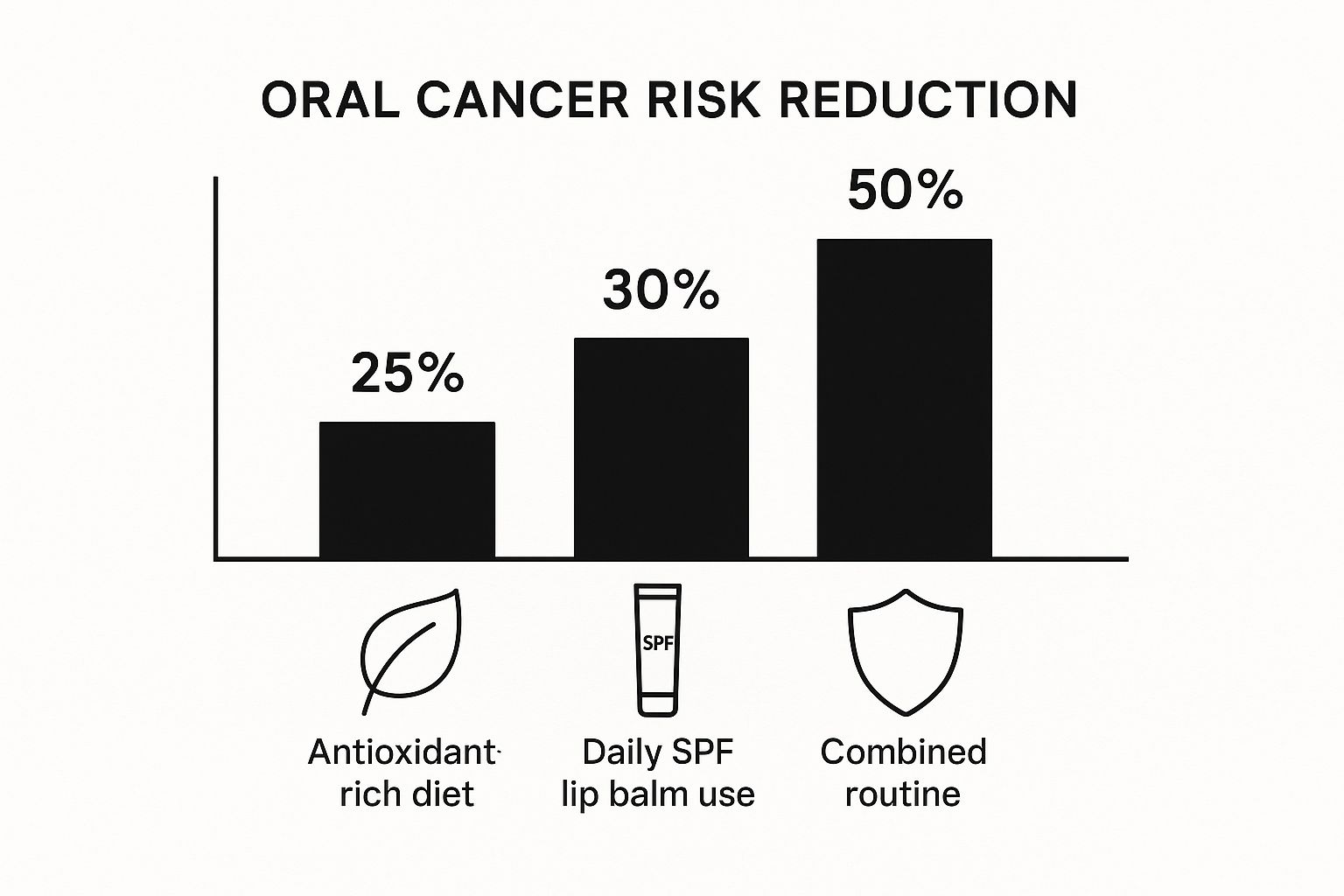
This infographic gets straight to the point: combining a nutrient-packed diet with daily sun protection for your lips dramatically reduces your risk. The data is clear. When you adopt these simple habits together, their protective effect multiplies, giving you a substantial defence against potential harm.
Fuel Your Body’s Defences
I often tell my patients to think of their diet as a way to arm their body’s cells against attack. Certain foods are brimming with antioxidants—natural compounds that neutralise damaging molecules called free radicals before they can cause real trouble. It’s like having an internal security team on patrol, 24/7.
It’s not just about hitting your “five a day.” It’s about being strategic. Focus on incorporating specific, cancer-fighting foods into your meals. A great rule of thumb is to aim for variety and colour, as different pigments often signal different types of protective nutrients.
A few excellent, easy additions to your diet include:
- Leafy Greens: Spinach, kale, and rocket are packed with vitamins and antioxidants essential for good cellular health.
- Berries: Blueberries, strawberries, and raspberries are antioxidant powerhouses that help fight inflammation and protect your cells.
- Tomatoes: A fantastic source of lycopene, a potent antioxidant that has been linked to reducing the risk of several types of cancer.
- Green Tea: It contains unique compounds called catechins, which studies have shown can help slow the growth of cancerous cells.
You don’t need to completely overhaul your diet overnight. Small changes make a big difference. Try adding a handful of spinach to a smoothie or swapping your afternoon biscuit for a bowl of berries. These little adjustments really do add up, creating a much stronger internal defence system over time.
Don’t Forget Your Lips
One of the most overlooked areas in oral cancer prevention is protecting your lips from the sun. The skin here is incredibly thin and delicate, which makes it highly susceptible to damage from the sun’s ultraviolet (UV) rays. Many people don’t realise that skin cancer on the lips is actually a form of oral cancer.
It’s strange, isn’t it? We’re often so diligent about putting sun cream on our face but completely forget our lips. This creates a real vulnerability, especially for the lower lip, which tends to get the most direct sun exposure.
Making SPF lip balm a non-negotiable part of your daily routine is one of the simplest yet most effective preventative actions you can take. It’s a two-second habit that provides hours of crucial protection.
Creating a Sun-Safe Routine
Protecting your lips from the sun should be as automatic as brushing your teeth. It’s all about integrating simple, protective habits into your everyday life until they become second nature.
Here’s how you can build a solid sun-safety habit for your lips:
- Choose the Right Balm: Look for a lip balm with an SPF of 30 or higher that offers broad-spectrum (UVA/UVB) protection. I suggest keeping one in your car, one in your bag, and one by the door so you never leave home without it.
- Reapply Often: Just like sun cream, lip balm wears off. You need to reapply it, especially after eating, drinking, or swimming. A good rule is to reapply every two hours if you’re spending a lot of time outdoors.
- Wear a Hat: A wide-brimmed hat is an excellent first line of defence. It provides shade not just for your lips, but for your whole face and neck. It’s both a stylish and practical way to slash your overall UV exposure.
And remember, these habits aren’t just for sunny summer days. Damaging UV rays are present all year round, even when it’s cloudy. By making these small changes, you’re building a powerful shield against one of the most preventable causes of lip cancer. At Toothfairy, we’re all about proactive health, and we know that small, affordable steps—like using SPF balm or choosing healthier foods—are the foundation of long-term wellbeing.
Your Dentist Is Your First Line of Defence
It’s easy to think of a dental check-up as just a “scale and polish,” but it’s so much more than that. Your regular visit is one of the most powerful tools you have for catching oral cancer early. Honestly, it’s your first and best line of defence. Your dentist has spent years training their eyes to spot the subtle, early signs of trouble that you would almost certainly miss looking in your own bathroom mirror.
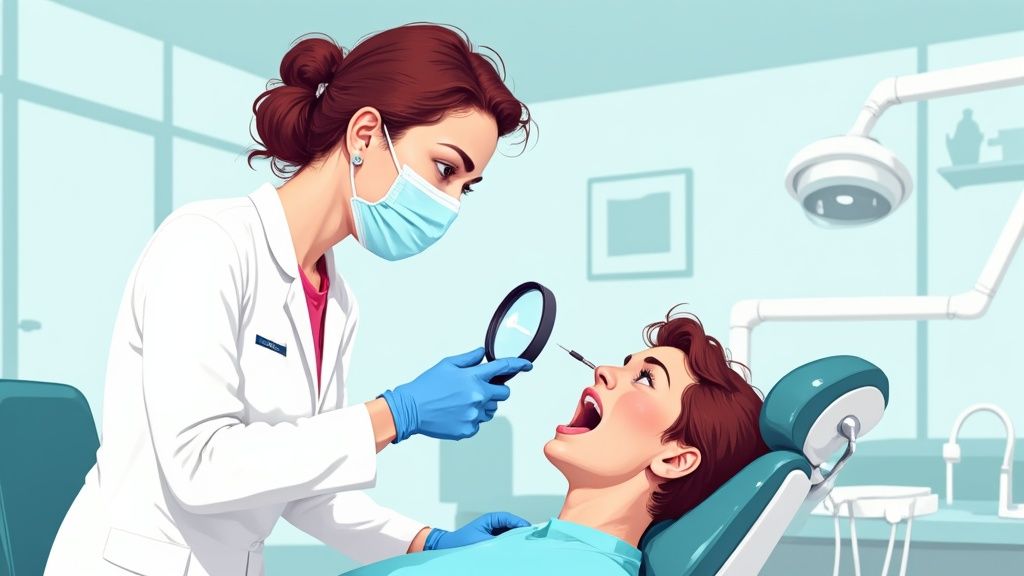
This is why getting to the dentist regularly is so non-negotiable. I’ve seen first-hand how cost or inconvenience can cause people to put off appointments, but these are barriers that simply shouldn’t exist when a check-up could be life-saving. At Toothfairy, we’re working to break down those barriers, making it simpler and more affordable to connect with a qualified dentist for everything from emergencies to routine advice. The key is making sure professional eyes are on your health when you need them.
What Happens During a Professional Screening
Let’s demystify what an oral cancer screening actually involves, because it’s nothing to be anxious about. It’s a quick, totally painless part of any thorough dental exam where your dentist is essentially playing detective, looking for anything that seems out of the ordinary.
Here’s what they’ll do:
- A Visual Check: Your dentist will carefully examine your entire mouth. We’re talking lips, the inside of your cheeks, your gums, the top and bottom of your tongue, the roof of your mouth, and right to the back of your throat. They’re looking for any asymmetries, unusual swelling, or patches of colour that shouldn’t be there.
- A Physical Check: Next, they’ll gently use their fingers to feel the tissues in your mouth, as well as around your neck and jaw. This simple step helps them find any unusual lumps, bumps, or masses that might be hiding out of sight.
- A Quick Chat: Your dentist will probably ask if you’ve noticed any changes yourself—things like a sore that won’t go away, any trouble swallowing, or a strange numbness. What you’ve noticed is a really important piece of the puzzle.
The whole thing takes just a couple of minutes, but the peace of mind it provides is invaluable.
Get to Know Your Own Mouth with Home Self-Checks
While nothing replaces a professional eye, what you do between appointments is just as important. Getting into the habit of a monthly self-check puts you in the driver’s seat of your own health. The aim isn’t to diagnose anything yourself, but to become so familiar with what’s normal for your mouth that you can spot a change the moment it appears.
Find a mirror with good light and take a minute to look over these areas:
- Face and Neck: Gently feel along both sides of your neck and under your jaw for any new lumps or bumps.
- Lips and Gums: Pull your lips up and then down to get a clear view of your gums, looking for any sores or odd changes in colour.
- Inside Your Cheeks: Pull each cheek out to see the inner lining. Are there any red, white, or dark patches?
- Tongue: Stick your tongue out and look at the whole surface. Then, gently pull it side-to-side to check the edges. Don’t forget to lift your tongue to check underneath and the floor of your mouth.
- Roof of Your Mouth: Tilt your head back for a good look at the hard and soft palate.
Catching potential issues early dramatically improves outcomes. A professional screening is your best tool for detection, but your own monthly checks create an essential safety net between appointments.
This isn’t about being paranoid; it’s just about being observant. If you find a sore that hasn’t healed within two weeks, a persistent lump, or a strange-coloured patch, don’t just wait and see. That’s your cue to call your dentist for a professional opinion.
Professional Screening vs Home Self-Check
It’s crucial to understand how your own checks and a professional screening work together. One doesn’t replace the other; they are a team. A professional can spot what you can’t, and you can spot what’s changed since you last saw them.
| Check Type | What the Professional Looks For | What You Should Look For at Home |
|---|---|---|
| Professional Screening | Subtle tissue changes and tiny lesions an untrained eye would miss. They can also feel for lumps deeper in the neck and jaw. | Obvious changes from your mouth’s normal appearance—things that have popped up since your last dental visit. |
| Home Self-Check | Any new spots, sores that refuse to heal, unusual lumps you can feel, or patches of colour (especially red or white). | Any new spots, sores that refuse to heal, unusual lumps you can feel, or patches of colour (especially red or white). |
Ultimately, both are about paying attention. Whether you’re looking into clear aligners to straighten your teeth or just need a routine check-up, your journey should always start with a comprehensive oral health assessment. This initial exam is the perfect time for a professional to confirm everything looks healthy, giving you a clean bill of health and the confidence to move forward.
The Growing Link Between HPV and Oral Cancer
When we talk about oral cancer, tobacco and alcohol are usually the first things that come to mind. But there’s another crucial piece of the puzzle we need to discuss: the Human Papillomavirus, or HPV.
HPV is now recognised as a major cause of cancers in the mouth and, particularly, the back of the throat (the oropharynx). What’s really brought this to the forefront is its rising prevalence in younger, non-smoking individuals. This isn’t about causing alarm; it’s about being informed and taking a modern, comprehensive approach to prevention.
How Does HPV Connect to Oral Cancer?
HPV is incredibly common. There are over 100 different types, and most of them are harmless—our immune systems usually clear them without any fuss. The problem lies with a few “high-risk” strains, especially HPV16.
When a high-risk strain infects the cells in the mouth and throat, it can, over many years, trigger changes that lead to cancer. These cancers often pop up in hard-to-see places like the tonsils or the base of the tongue, which makes professional screenings even more vital.
The statistics really drive home why this is so important. In the UK, we see about 12,800 new cases of head and neck cancers each year. The crucial takeaway is that a huge chunk of these are preventable. For cancers inside the mouth, an estimated 46% of cases could be avoided by tackling risk factors like smoking, drinking, and high-risk HPV. You can dig deeper into the data from Cancer Research UK.
The Power of the HPV Vaccination Programme
Thankfully, we have a fantastic tool for prevention right here in the UK: the national HPV vaccination programme. It’s offered to secondary school-aged boys and girls and has been a massive public health success.
The vaccine works by teaching your immune system to recognise and fight off the main cancer-causing HPV strains, including HPV16, before they can do any harm. We’ve already seen its incredible impact on preventing cervical cancer, and those same protective benefits extend to HPV-related oral cancers. If you’re looking into this, a good starting point is understanding vaccine efficacy to see just how effective this kind of preventative medicine can be.
The HPV vaccine is one of the most effective cancer prevention tools we have. It’s a simple, safe way to provide profound, long-term protection against several types of cancer, including those in the mouth and throat.
Other Factors That Increase Irritation
Beyond major risk factors like HPV, it’s also worth paying attention to anything that causes chronic, low-grade irritation in your mouth. Think of it like this: constant irritation can weaken the delicate tissues, creating an environment where abnormal cells might have an easier time developing.
Keep an eye out for these common culprits:
- Poor Oral Hygiene: If you’re not brushing and flossing properly, plaque and bacteria build up. This leads to persistent gum inflammation (gingivitis), which puts your oral tissues under constant stress.
- Ill-Fitting Dentures or Braces: Anything that rubs, digs, or presses on your gums and cheeks day after day can create sores that never quite heal properly. This could be poorly fitted dentures or even a stray wire from some types of aligners.
- Habitual Biting: Constantly chewing on the inside of your cheek or lip creates areas of chronic trauma that struggle to repair themselves.
This is where having easy access to a professional makes all the difference. A dentist can spot these issues early, whether it’s adjusting a denture for a better fit or ensuring your teeth-straightening journey is smooth and comfortable. With Toothfairy, getting that expert advice is much simpler and more affordable. By managing these seemingly small irritants, you’re taking another positive step towards a healthier mouth and a lower overall cancer risk.
Your Questions About Oral Cancer Prevention, Answered
It’s one thing to read about risks and prevention, but it’s another thing entirely to figure out how it all applies to your own life. Let’s tackle some of the most common questions people have. We’ll cut through the noise and give you clear, practical answers so you can feel confident in protecting your oral health.
Can I Make Myself Completely Immune to Oral Cancer?
It’s a great question, but the honest answer is no one can eliminate their risk entirely. The goal isn’t to achieve a zero-percent chance, but rather to build the strongest possible defence against it. You have a huge amount of control here.
Research has shown that a massive number of oral cancer cases are preventable simply by tackling the main risk factors head-on. The most powerful steps you can take are quitting tobacco for good, limiting alcohol, and loading your diet with nutrient-rich foods.
You can then add more layers of protection, like using lip balm with SPF and getting the HPV vaccine. But your absolute best friend in this fight is early detection. That’s why regular dental screenings are non-negotiable—they’re designed to spot anything suspicious at the earliest, most treatable stage.
What If I Only Smoke or Drink Occasionally?
This is something I hear a lot. It’s easy to think that just a few cigarettes or drinks here and there won’t do much harm. Unfortunately, when it comes to tobacco, there’s no “safe” amount. Every time you smoke or vape, you’re exposing the delicate tissues in your mouth to carcinogens. The less you do it, the better.
With alcohol, the risk tends to build up over time—the more you drink, the higher the risk. The real danger, though, is when you combine the two. Smoking and drinking together don’t just add to your risk; they multiply it.
The smartest move is to quit tobacco completely and be mindful of your alcohol intake. Every single time you choose not to smoke or have one less drink, you’re making a real, positive difference to your long-term health. It all adds up.
How Often Should I Be Screened for Oral Cancer?
An oral cancer screening should be a standard part of every single one of your routine dental check-ups. It’s quick, painless, and a trained professional can do it in just a couple of minutes.
For most adults, this works out to a screening every six to twelve months, whenever you go for your regular clean and check-up. Your dentist will have a thorough look and feel of your mouth, tongue, gums, neck, and throat for anything unusual.
Between those professional visits, it’s a brilliant idea to do a quick self-exam at home once a month. This helps you get to know what’s normal for your mouth, so you’re far more likely to notice any new lumps, bumps, or sores that hang around and need a professional eye.
Is it a Bad Idea to Straighten My Teeth if I’m Worried About My Oral Health?
Quite the opposite, actually! When it’s supervised by a dental professional, straightening your teeth can be a big plus for your overall oral health. Think about it: teeth that are properly aligned are much, much easier to keep clean. This means less plaque build-up and a lower risk of gum inflammation, which all contributes to a healthier mouth.
Any credible teeth-straightening plan, whether it’s for modern aligners or another cosmetic treatment, will always begin with a full oral health assessment. This initial check is a perfect opportunity for a dentist to confirm everything is healthy before you start. It’s essentially a built-in screening that gives you both peace of mind. While some specific aligner brands can cause a bit of irritation if they aren’t monitored properly, a professionally supervised process genuinely supports good oral health.
At Toothfairy, we believe proactive dental care should be straightforward and accessible. Whether you’re looking for a smarter, more affordable way to straighten your teeth, need urgent dental advice, or want to explore cosmetic options, our app connects you with qualified UK dentists right from your phone. Start your journey to a healthier smile today by visiting the Toothfairy website.
Last updated on October 21, 2025

Toothfairy Care Team
Toothfairy, is the world's smartest dental app, that connects patients to a dentist for a range of issues, from emergencies, cosmetics, prescriptions to virtual exams.
Toothfairy Care Team
Toothfairy, is the world's smartest dental app, that connects patients to a dentist for a range of issues, from emergencies, cosmetics, prescriptions to virtual exams.

